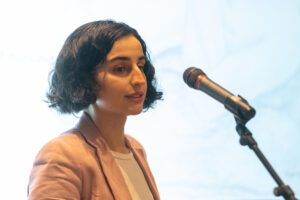Hands Up for Trad’s Women in Music and Culture 2023 list has been announced to celebrate just some of the women working in Scotland.
Launched as part of International Women’s Day 2023, we shine the spotlight on 15 women who all contribute towards Scotland’s cultural landscape through their work. Read the list here.
We asked Ashley Douglas to tell us more about there work, influences and ambitions for the future.
How did you first get involved in the arts and who were your early influences?
I’ve always loved languages, but it wasn’t until I was studying languages at university for my undergraduate degree – particularly German and Danish – that I came to realise that the Scots that I had always spoken is also a language, separate to English, and with its own unique links to other Germanic languages. This undergraduate study gave me a firm footing in linguistics and translation.
I then did master’s degrees in both Archaeology and Scottish History, which gave me a rich understanding and appreciation of the central role of Scots in our history – even although this is regrettably not often recognised today, as Scots has become minoritised in more recent times.
Since university, I have developed a career as a multi-lingual researcher, writer, translator, and consultant, specialising in Scots. It is a privilege to be able to combine my areas of expertise and channel my passion for both language and history.
At a time which has been very challenging for many people working in the arts, how did you use the last 3 years to develop your creativity?
The biggest inspiration of the last 3 years has been my on-going work on the Maitland Quarto manuscript, which combines my two main passions of Scots and LGBT history. In particular, in September 2021, Scotland became the first country in the world to embed LGBT inclusive education in schools. It was a great professional and personal honour to work with the charity Time for Inclusive Education to develop teaching resources, based on my own research, about a remarkably early lesbian love poem in Scots – Poem 49 of the Maitland Quarto manuscript, written by Scottish noblewoman Marie Maitland in the 1580s.
Who or what interests you creatively?
I am driven by telling the stories of and representing entire groups who have traditionally unfairly been excluded from Scottish history and culture, yet who have always been part of it, from women and LGBT people to people of colour. In more recent times, since it has become a minoritised language, Scots speakers have also been marginalised.
When promoting Scots as a minoritised language, it is important that we don’t forget to also promote marginalised groups within that. The Scots cultural sphere can often be very white, very male and very straight, but Scots is, and always has been, spoken by all sorts of people. We need to reflect that in order to be inclusive of and celebrate everyone.
I recently worked with the Scottish National Portrait Gallery to write interpretation boards in both Scots and English to accompany an imagined portrait of the remarkable poet, Marie Maitland, who wrote lesbian love poetry in Scots in the 1580s. This is the first time that there have been Scots interpretation boards in the gallery, and they tell the story of a crucial figure of Scotland’s LGBT history – representing Scots, women, and LGBT history at one and the same time.
What are your plans for the next year or so and/or what are your longer term creative ambitions?
I am focused on researching and writing a book about Marie Maitland, Scotland’s Sappho, who penned powerful lesbian love poetry, in Scots, in the 1580s.
I am excited and honoured to be continuing to work with Time for Inclusive Education. We will be launching new inclusive education resources soon – including in Scots – making sure that all bairns see themselves represented in their learning.
I am also involved in a very exciting project with Historic Scotland, piloting the first ever audio tours in Scots, at Linlithgow Palace. For the first time, Scots speakers will be able to experience the palace’s history, which took place largely in (medieval) Scots, in the Scots they speak and understand today.
Find out more about Ashley Douglas here.
Hands Up for Trad are an organisation who work with Scottish traditional music, language and culture. If you would like to support our work you can donate here.
